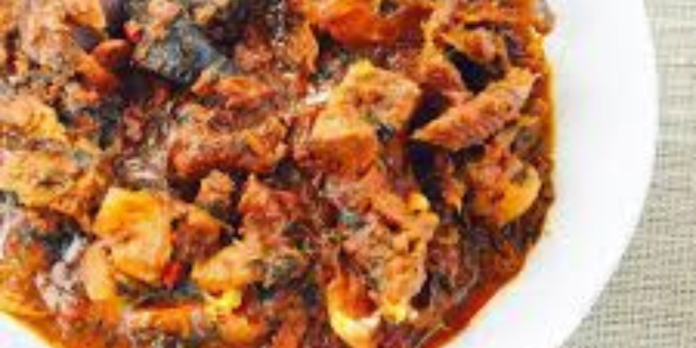Table of Contents
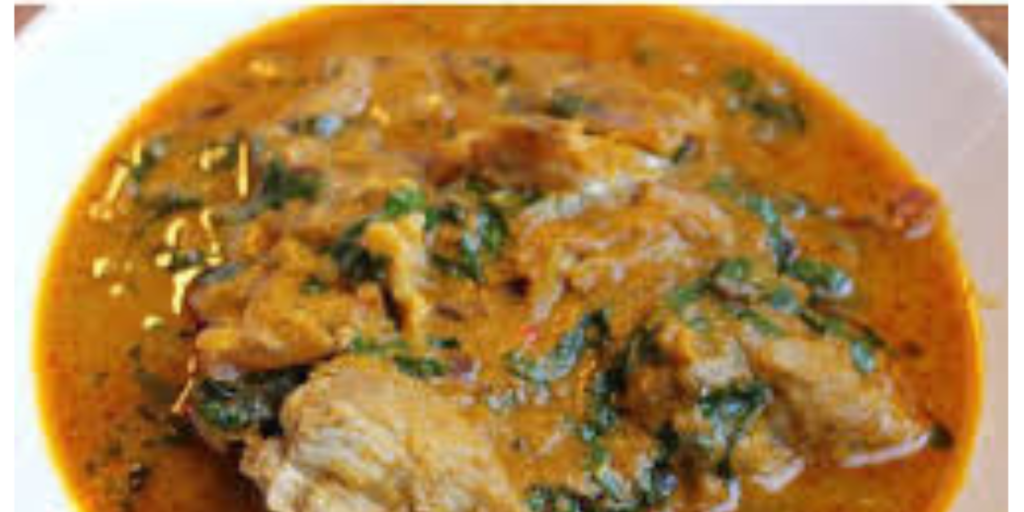
Banga Soup : Imagine the rich aroma of simmering palm nut cream mingling with an exotic blend of spices, tender chunks of meat, and fresh seafood. This sensory experience is quintessentially Benin Banga Soup, a dish that embodies the culinary excellence of the Benin people. Whether you’re a seasoned cook or a culinary adventurer, learning to make this traditional soup will transport you to the heart of Benin’s vibrant food culture.
Brief Overview
Benin Banga Soup, a staple in the Edo State of Nigeria, is renowned for its unique blend of flavors and hearty ingredients. Unlike its counterparts from other regions, Benin Banga Soup incorporates a distinctive set of spices and preparation techniques that set it apart. This article will guide you through the intricate process of making the best Benin Banga Soup, compare it with other variants like Rivers State Banga Soup and Delta State Banga Soup, and address common questions to help you perfect this dish at home.
Series Context
Welcome to another installment in our series exploring Nigeria’s rich culinary heritage. Following our deep dive into Rivers State Banga Soup, this article focuses on Benin Banga Soup, a beloved dish with its own unique charm. Stay tuned as we continue our journey through Nigeria’s diverse soup recipes, and don’t forget to check out our previous articles for a complete culinary adventure.
Historical and Cultural Context
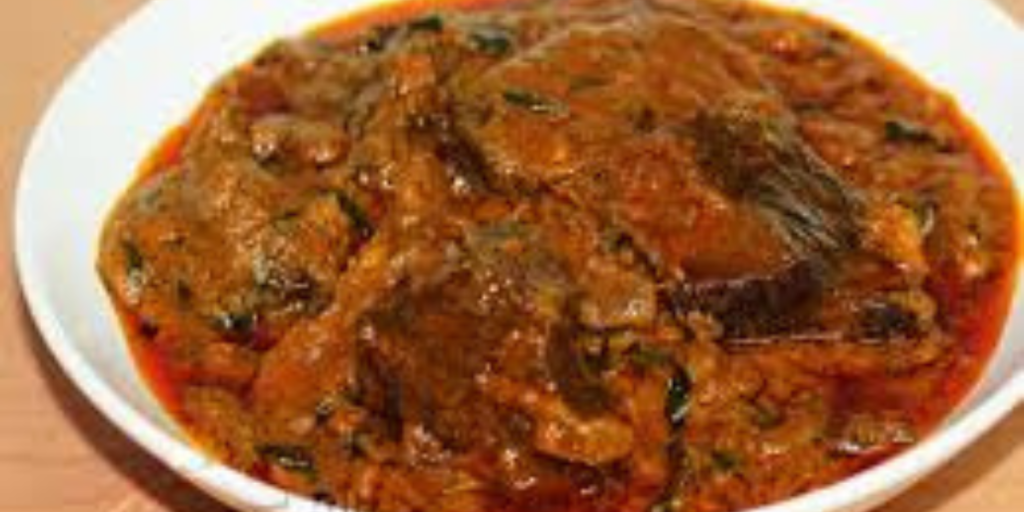
Origins of Banga Soup
Benin Banga Soup, also known as “Omi Ukodo,” has its roots in the ancient Benin Kingdom. Historically, it was a dish reserved for special occasions and royal feasts, reflecting the abundance of natural resources in the region. The use of palm nuts, fresh fish, and indigenous spices highlights the Benin people’s connection to their environment and their culinary ingenuity.
Ingredients and Their Cultural Importance
The ingredients in Benin Banga Soup are not merely for flavor; they are symbols of cultural heritage. Palm nuts, which form the base of the soup, are abundant in Edo State and have been used in various traditional dishes for centuries. Fresh fish from the region’s rivers, combined with locally sourced spices, creates a symphony of flavors that represent the Benin people’s resourcefulness and rich cultural traditions.
The Best Delta Banga Soup Recipe of 2024
Ingredients and Preparation
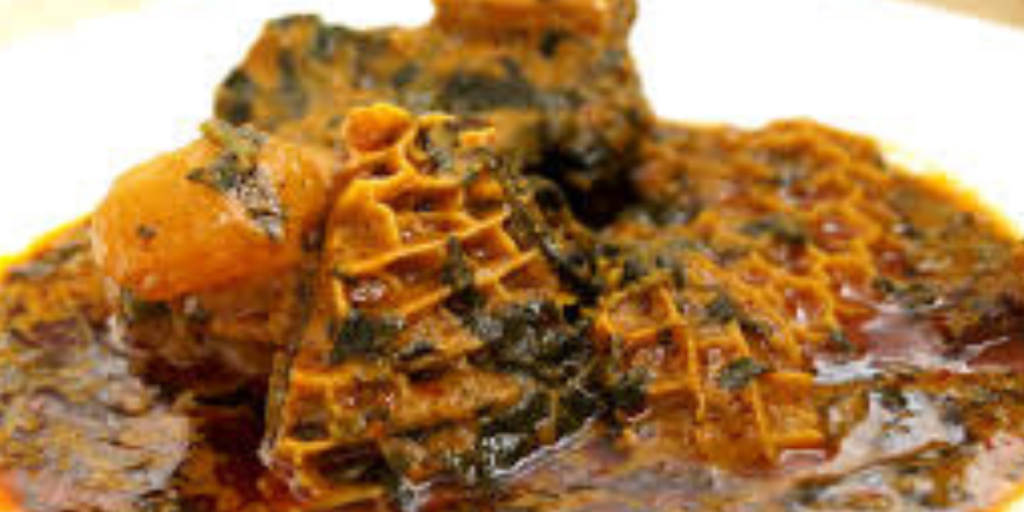
Detailed Ingredients List
- Palm nuts (2 kg): The core ingredient, providing a rich, creamy base.
- Fresh fish (500 g): Common choices include catfish, tilapia, or any firm white fish.
- Goat meat (500 g): Adds a hearty texture and flavor.
- Beef (500 g): Provides additional richness.
- Crayfish (100 g): Ground crayfish adds depth of flavor.
- Fresh pepper (to taste): Scotch bonnet or habanero peppers for heat.
- Bitter leaf (a handful): Adds a slightly bitter, earthy flavor.
- Benin Banga spice mix (2 tablespoons): A unique blend of local spices including uyayak, ataiko, and iru.
- Stock cubes (3): Enhances the savory flavor.
- Salt (to taste): Essential for seasoning.
- Water (as needed): For cooking and adjusting the consistency of the soup.
Ingredient Preparation
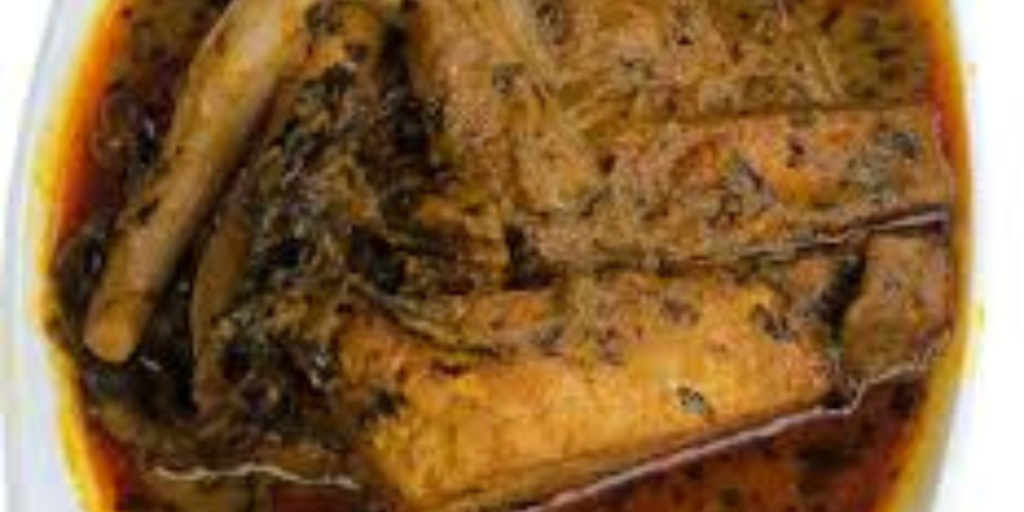
Extracting Palm Nut Cream
- Boiling Palm Nuts: Start by boiling the palm nuts until they are soft, which takes about 30-45 minutes.
- Pounding and Extracting Cream: Transfer the softened palm nuts to a mortar and pound them to extract the creamy juice. Add warm water intermittently to help release the cream.
- Straining the Mixture: Strain the mixture through a fine sieve to separate the creamy extract from the chaff. Set the palm nut cream aside.
Preparing the Meat and Fish
- Marinating the Meat: Clean and cut the goat meat and beef into bite-sized pieces. Season with salt and two stock cubes, then let them marinate for at least 30 minutes.
- Cleaning the Fish: Clean the fish and cut it into manageable pieces, seasoning lightly with salt.
Banga Soup | Best Ofe Akwu Recipe of 2024
Cooking Instructions
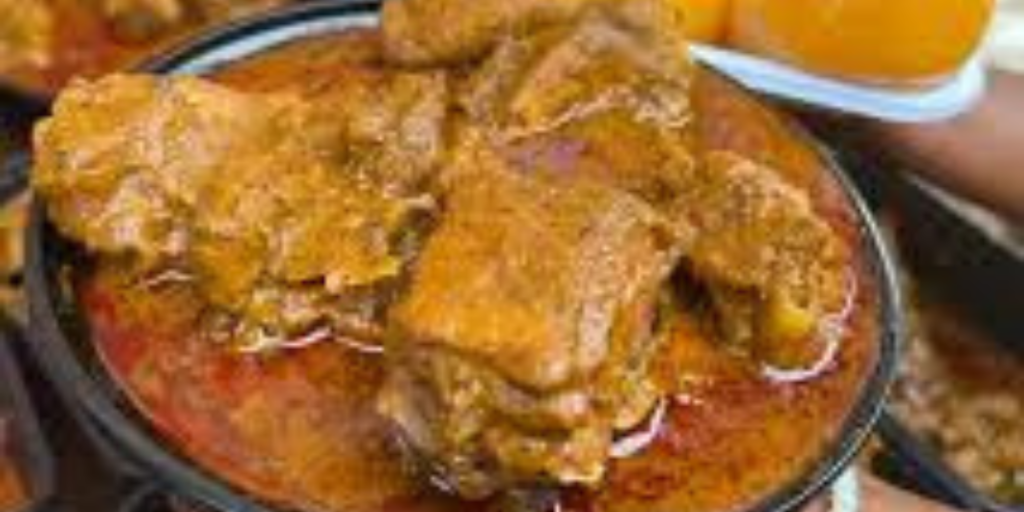
Step-by-Step Guide
Extracting Palm Nut Cream
After boiling and pounding the palm nuts, strain the mixture to get a smooth, creamy extract. This creamy extract is the heart of your Banga Soup and should be set aside in a large bowl.
Preparing the Meat and Fish
While the palm nuts are boiling, season the goat meat and beef with salt and stock cubes. Let them marinate for about 30 minutes to absorb the flavors. Clean and cut the fish into pieces, then set aside.
Cooking the Soup
- Preparing the Base: In a large pot, pour the extracted palm nut cream and add water to achieve a medium consistency. Bring the mixture to a boil over medium heat.
- Adding the Meat: Add the marinated goat meat and beef. Cook until the meat starts to tenderize.
- Incorporating Flavors: Add the ground crayfish and fresh pepper, stirring well. Gradually add the Benin Banga spice mix, ensuring each ingredient blends well before adding the next.
- Cooking the Fish: Once the meat is almost cooked, add the fish and allow it to cook for another 10-15 minutes.
- Final Touches: Towards the end of the cooking process, add the bitter leaf sparingly, as it can easily overpower the soup if too much is added. Adjust the seasoning with salt and additional spices if needed. Let the soup simmer for another 5-10 minutes to allow all flavors to meld together beautifully.
Banga Soup |Rivers State Banga soup Recipe Best 1
Serving Suggestions
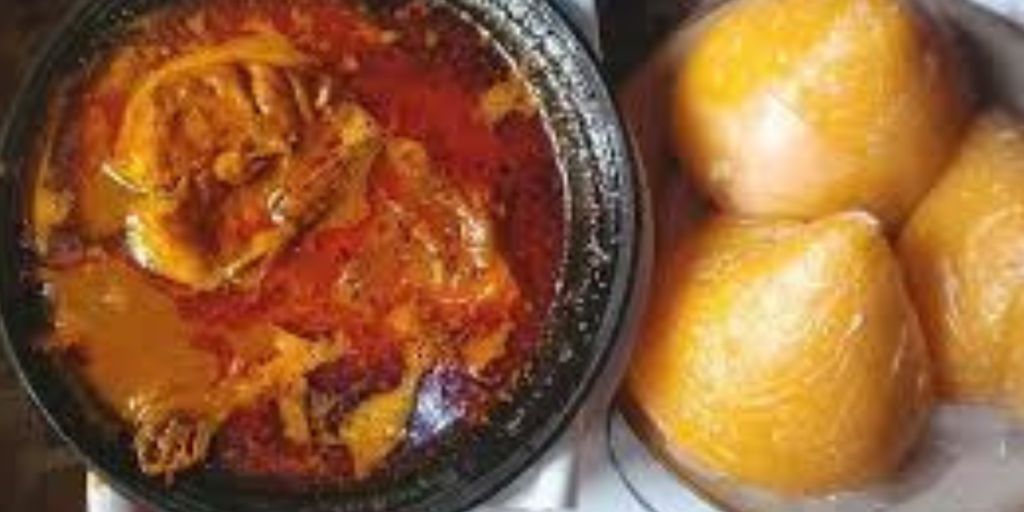
Traditional Serving Methods
Benin Banga Soup is traditionally served with starch-based accompaniments like pounded yam, eba, or fufu. These side dishes are perfect for soaking up the rich, flavorful broth of the soup. In many Benin households, the soup is served in a communal bowl, encouraging a shared dining experience that fosters a sense of community and togetherness.
Modern Twists
For a contemporary twist, consider serving Benin Banga Soup in individual bowls with a side of jasmine rice or couscous. Garnish with a sprinkle of fresh herbs like parsley or cilantro for a burst of color and freshness. This modern presentation can make the dish more approachable for those unfamiliar with traditional Nigerian cuisine.
Nutritional Information
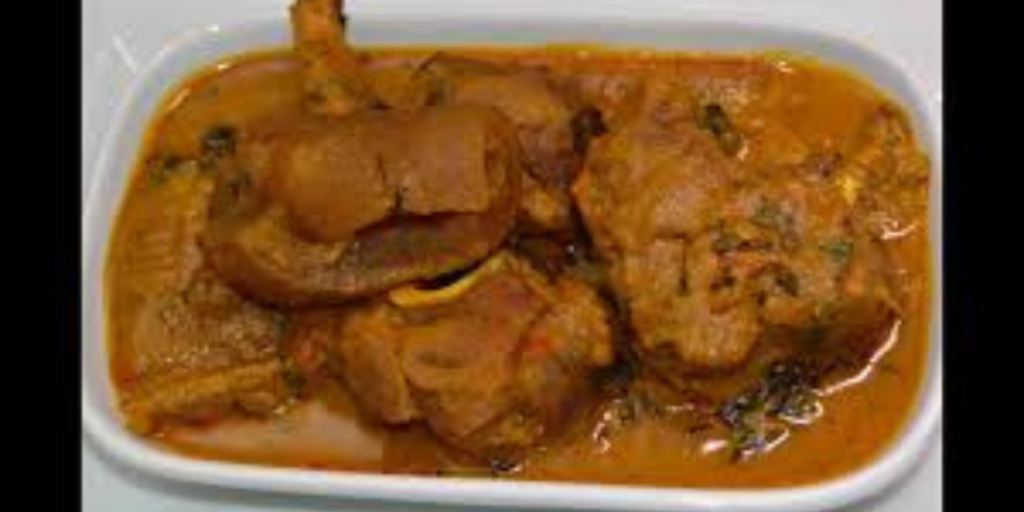
Health Benefits
Benin Banga Soup is not only delicious but also packed with nutrients. Palm nuts are rich in vitamins A and E, essential for maintaining good vision and skin health. The inclusion of fish and meat provides high-quality protein necessary for muscle growth and repair. Bitter leaf is known for its medicinal properties, including improving digestion and reducing blood sugar levels. Crayfish adds a significant amount of calcium and other essential minerals.
Dietary Considerations
While Benin Banga Soup is nutritious, it’s important to be mindful of portion sizes, especially for those watching their calorie intake. The soup’s richness can make it quite calorie-dense, so pairing it with lighter sides like steamed vegetables can create a balanced meal.
Banga Soup And Starch Nigerian Best of 2024
Comparing with Other Regional Banga Soups
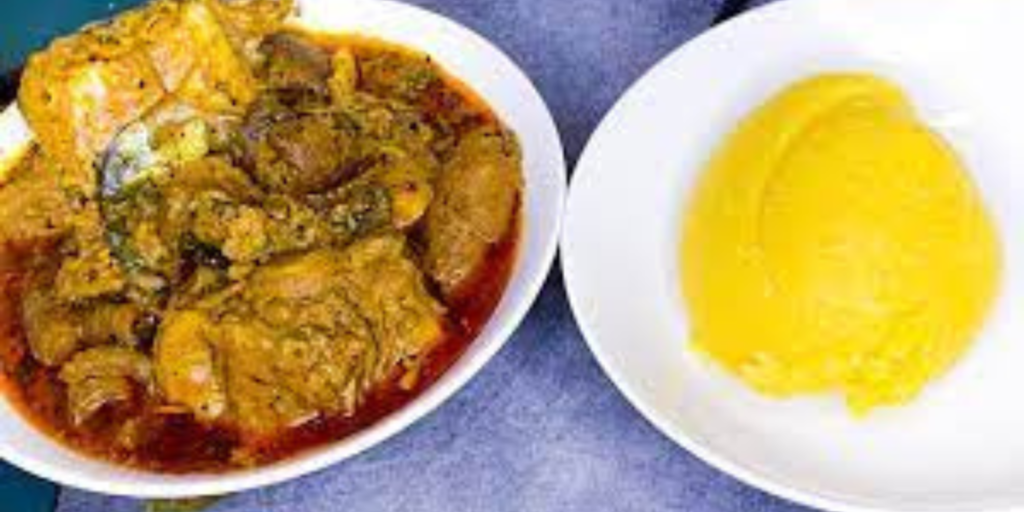
Key Differences
Rivers State Banga Soup
Rivers State Banga Soup incorporates a distinctive blend of spices and often includes seafood like prawns and snails. The flavor profile is spicier and more complex, reflecting the region’s coastal influences. In contrast, Benin Banga Soup tends to be more balanced and less spicy, with a greater emphasis on the unique flavors of its local spices.
Delta State Banga Soup
Delta State Banga Soup is similar to the Benin variant but often includes more indigenous spices like beletete and atariko, giving it a unique flavor profile. Delta State Banga Soup also places a greater emphasis on seafood, reflecting the region’s abundant aquatic resources. Benin Banga Soup, on the other hand, often features a mix of meats and fish, providing a hearty and diverse flavor experience.
Personal Anecdotes
Growing up, Banga Soup was a staple in our household, especially during festive occasions. I remember my grandmother’s meticulous process of extracting palm nut cream, a skill she passed down to my mother. Each family gathering was incomplete without a large pot of Banga Soup, its aroma filling the house and drawing everyone to the dining table. While I appreciate the flavors of other regional Banga Soups, there’s something uniquely comforting about the Benin variant that always brings me back home.
Frequently Asked Questions (FAQs)
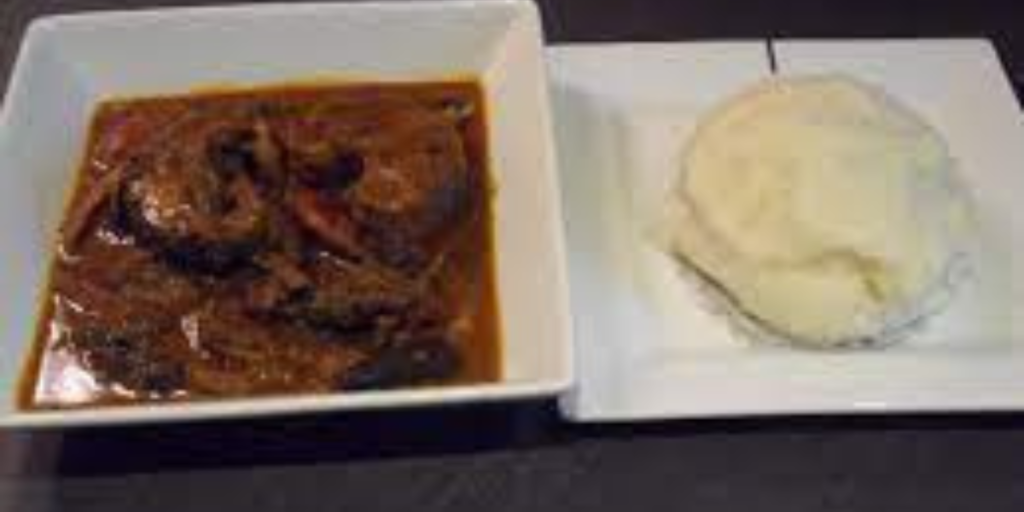
Common Questions and Detailed Answers
- Can I use canned palm nut cream?
- Yes, canned palm nut cream can be a convenient alternative if you don’t have access to fresh palm nuts. However, the flavor may differ slightly, so adjust your spices accordingly.
- What meats are best for Banga Soup?
- Goat meat, beef, and fish are traditional choices. However, you can also use chicken, turkey, or even snails for a different twist.
- How can I make the soup spicier/milder?
- Adjust the amount of fresh pepper to suit your taste. For a milder soup, use fewer peppers and consider adding sweet bell peppers for a subtle flavor.
- Can Banga Soup be frozen and reheated?
- Yes, Banga Soup can be frozen for up to three months. Reheat gently over low heat to preserve the flavors and texture.
- Are there vegetarian versions of Banga Soup?
- Absolutely. Substitute the meat and fish with mushrooms, tofu, or other plant-based proteins. Ensure to enhance the flavor with additional spices and vegetable stock.
Conclusion
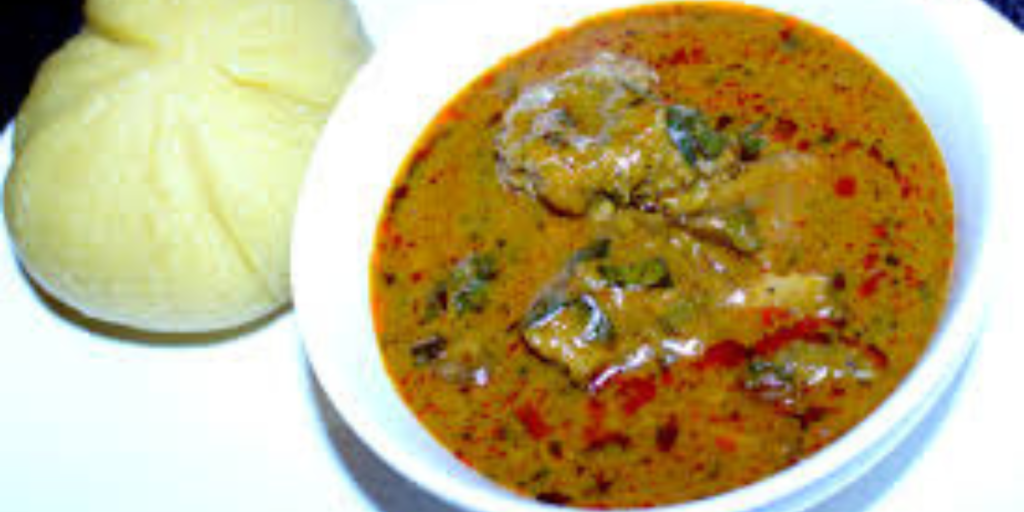
Final Thoughts
Benin Banga Soup is a culinary masterpiece that captures the essence of Nigerian cuisine. Its rich, complex flavors are a testament to the region’s diverse cultural heritage and natural abundance. Whether you’re a seasoned cook or a culinary novice, this guide provides all the steps and tips you need to recreate this traditional dish in your own kitchen.
We hope this comprehensive guide inspires you to try your hand at making Benin Banga Soup. We’d love to hear about your experiences, so please share your thoughts, tips, and variations in the comments section. Don’t forget to like this article and share it with your friends and family. Your feedback and engagement help us continue to bring you more delightful content.
References
- Nigerian Cuisine: The Heart of Traditional Cooking by Olusegun Obasanjo
- The Complete Guide to Nigerian Soups by Adaobi Amaka
- Culinary Heritage of the Niger Delta by Ebiye Onome
- Personal interviews with local chefs and home cooks in Edo State
















